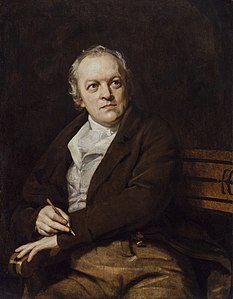Analysis of The Four Zoas (excerpt)
William Blake 1757 (Soho) – 1827 (London)
'What is the price of Experience? do men buy it for a song?
Or wisdom for a dance in the street? No, it is bought with the price
Of all that a man hath, his house, his wife, his children.
Wisdom is sold in the desolate market where none come to buy,
And in the wither'd field where the farmer plows for bread in vain.
It is an easy thing to triumph in the summer's sun
And in the vintage and to sing on the waggon loaded with corn.
It is an easy thing to talk of patience to the afflicted,
To speak the laws of prudence to the houseless wanderer,
To listen to the hungry raven's cry in wintry season
When the red blood is fill'd with wine and with the marrow of lambs.
It is an easy thing to laugh at wrathful elements,
To hear the dog howl at the wintry door, the ox in the slaughter house moan;
To see a god on every wind and a blessing on every blast;
To hear sounds of love in the thunder storm that destroys our enemies' house;
To rejoice in the blight that covers his field, and the sickness that cuts off his children,
While our olive and vine sing and laugh round our door, and our children bring fruits and flowers.
Then the groan and the dolor are quite forgotten, and the slave grinding at the mill,
And the captive in chains, and the poor in the prison, and the soldier in the field
When the shatter'd bone hath laid him groaning among the happier dead.
It is an easy thing to rejoice in the tents of prosperity:
Thus could I sing and thus rejoice: but it is not so with me.'
'Compel the poor to live upon a crust of bread, by soft mild arts.
Smile when they frown, frown when they smile; and when a man looks pale
With labour and abstinence, say he looks healthy and happy;
And when his children sicken, let them die; there are enough
Born, even too many, and our earth will be overrun
Without these arts. If you would make the poor live with temper,
With pomp give every crust of bread you give; with gracious cunning
Magnify small gifts; reduce the man to want a gift, and then give with pomp.
Say he smiles if you hear him sigh. If pale, say he is ruddy.
Preach temperance: say he is overgorg'd and drowns his wit
In strong drink, though you know that bread and water are all
He can afford. Flatter his wife, pity his children, till we can
Reduce all to our will, as spaniels are taught with art.'
The sun has left his blackness and has found a fresher morning,
And the mild moon rejoices in the clear and cloudless night,
And Man walks forth from midst of the fires: the evil is all consum'd.
His eyes behold the Angelic spheres arising night and day;
The stars consum'd like a lamp blown out, and in their stead, behold
The expanding eyes of Man behold the depths of wondrous worlds!
One Earth, one sea beneath; nor erring globes wander, but stars
Of fire rise up nightly from the ocean; and one sun
Each morning, like a new born man, issues with songs and joy
Calling the Plowman to his labour and the Shepherd to his rest.
He walks upon the Eternal Mountains, raising his heavenly voice,
Conversing with the animal forms of wisdom night and day,
That, risen from the sea of fire, renew'd walk o'er the Earth;
For Tharmas brought his flocks upon the hills, and in the vales
Around the Eternal Man's bright tent, the little children play
Among the woolly flocks. The hammer of Urthona sounds
In the deep caves beneath; his limbs renew'd, his Lions roar
Around the Furnaces and in evening sport upon the plains.
They raise their faces from the earth, conversing with the Man:
'How is it we have walk'd through fires and yet are not consum'd?
How is it that all things are chang'd, even as in ancient times?'
| Scheme | XXAXX AXXBAX XXXXAX XXX CC XXCXABDXCXXEX DXFGXXXAXXXGXXGXXXE FX |
|---|---|
| Poetic Form | |
| Metre | 1101101001111101 1101010011111101 1110111111110 1011001001011111 000101101011101 11110111000101 000100111011011 1111011111010010 1101110101100 11010101101010 101111110101011 1111011111100 110111010101001011 110111001001011001 1111100101101101001 101001110110010111110 110100110111010101011010 1010011101000110101 00100100100100010001 10101111100101001 11110110100110100 111101011111111 0101110101111111 11111111010111 11010011110010 01110101111101 11011001011110 01111111011110 1111001111111010 10110101110101111 111111111111110 110011110111 0111111101011 1101101110110111 0111101111111 011111001101010 001110010101 01111110100101101 11010101010101 010110111001101 001011101011101 11110111011011 11011101010011 11010111101101 100101110010111 11010010101011001 010101001110101 1101011100111001 1111101010001 010010111010101 010101010111 00110111011101 01010001010101 11110101010101 111111110011101 111111111010101 |
| Closest metre | Iambic octameter |
| Characters | 3,586 |
| Words | 694 |
| Sentences | 25 |
| Stanzas | 8 |
| Stanza Lengths | 5, 6, 6, 3, 2, 13, 19, 2 |
| Lines Amount | 56 |
| Letters per line (avg) | 50 |
| Words per line (avg) | 12 |
| Letters per stanza (avg) | 353 |
| Words per stanza (avg) | 86 |
Font size:
Submitted on May 13, 2011
Modified on April 19, 2023
- 3:32 min read
- 160 Views
Citation
Use the citation below to add this poem analysis to your bibliography:
Style:MLAChicagoAPA
"The Four Zoas (excerpt)" Poetry.com. STANDS4 LLC, 2024. Web. 1 May 2024. <https://www.poetry.com/poem-analysis/39171/the-four-zoas-%28excerpt%29>.


Discuss this William Blake poem analysis with the community:
Report Comment
We're doing our best to make sure our content is useful, accurate and safe.
If by any chance you spot an inappropriate comment while navigating through our website please use this form to let us know, and we'll take care of it shortly.
Attachment
You need to be logged in to favorite.
Log In